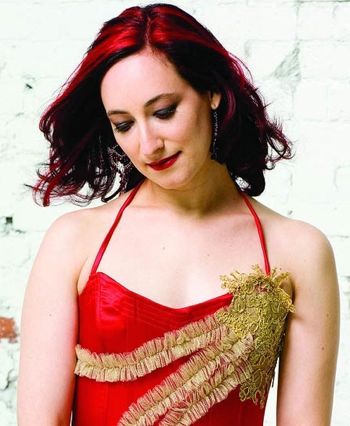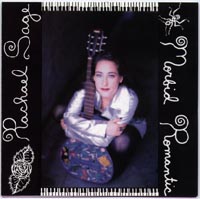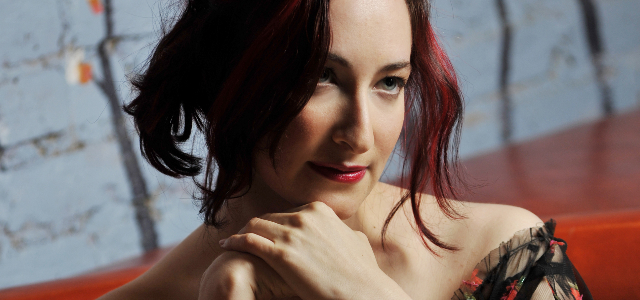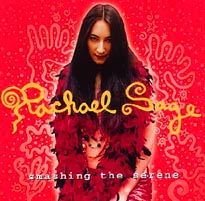
Image © 2000 Mpress Records
click on image to visit artists' website
Rachael Sage
Album Reviews and
Artist Reflections
Review and HTML © Russell W Elliot 2000
all images © Rachael Sage / Mpress records 1996-2000
Formatted for 800 x 600 or larger windows
Last updated: 03 April 2000 (02 June 2014)
Singer songwriter Rachael Sage is based in New York where she regularly performs live in a variety of venues as the main event and as an opening act. Recently she opened for November Project. With a vocal style resembling a cross between Kate Bush, Tori Amos, and Ani DiFranco, she has released two albums: Morbid Romantic (Mpress Records (USA) MP1818-2, 1996) and Smashing The Serene (Mpress Records (USA) MP3636-2, 1998). Rachael's work has been covered extensively in print media and while others have written about the sincerity and sensitivity of the lyrical content within her songs, we'll focus on the vocal and instrumental performances here. We had a unique opportunity to interview Rachael during the preparation of the album reviews. You'll find the result incorporated within this article.
We asked Rachael about her musical influences. She told us the story, "Aside from the Jewish music I'd grown up on in synogogue, some of the earliest influences I can recall as a very young musican starting to write songs were: Billy Joel, Elton John, Hall & Oates, James Taylor, Cat Stevens, Carole King, The Beatles, Buddy Holly, Gershwin, and many Broadway and classical composers to whom I was exposed in my studies as a ballet dancer." She continued, "I was extremely attuned to top 40 radio as a kid; I watched Solid Gold and American Bandstand and fantasized about being both a dancer and a musical performer on these shows. I had a very big crush on Andy Gibb, and I wanted to be the one to "save" him; I wrote a song about him when he died—I was about seven I think—and it was called 'Why Don't You Stay?'."
Rachael told us about her musical development, "In junior high school, I definitely got into the synth scene, Howard Jones, Depeche Mode, etc. I had a Jupiter-8 keyboard, a 4-track studio that my relatives got me for my Bat Mitzvah and a TR-505 drum machine and did a lot of demos using this equipment. It's hard to believe, but I was pretty techno'd-out back then! Later on, I heard Tracy Chapman, Suzanne Vega and the Indigo Girls and started to perk up to a whole other, more confessional/"storytelling" approach to lyric-writing. But it wasn't until I went to college that I really started to get into acoustic music; I'd never been in bands or anything, just solo at my keyboards, so being able to perform in an acoustic setting with another guitar player was a huge revelation, and I was hooked. I really haven't kept up with the whole tech-gear thing, I fell dismally behind once my interests shifted away from sequencing toward folk and world influences, and mostly all I wanted to hear on my own material from that point on were live, traditional instruments."
After these twists and turns, Rachael found her direction and a pattern developed. She told us, "Elvis Costello, Luka Bloom, Sinead O'Connor, Kate Bush, Ani DiFranco and Tori Amos were very influential while I was in school, where I also got a gig as a college radio DJ, and was able to hear all kinds of new music including Sarah McLachlan, who'd just put out her first album! I'd say that by the time I moved to New York City, it was all about poetry, piano, acoustic guitar, and live strings; no more computers!! Also, at the end of high school I visited Russia, and during college I lived in Ireland, and these two regions were huge influences on me musically."
 Image © 1996 Mpress Records |
Morbid Romantic. Rachael's twelve-track debut album is filled with stunning vocal work, sung sweetly and sensitively, accompanied by keyboards, strings and light percussion. Rachael sings all of the songs and provides combinations of piano, keyboards and acoustic guitar to the arrangements. Rachael comments about the albums' artwork later in the article. Her singing and songwriting styles are perfectly suited to the Coffee House venue and those that have caught a live performance must be very lucky indeed.
Most of the songs are ballad-like in their construction. The semi-spoken, Ani DiFranco- or Tori Amos-based, singing style is most evident in "Souvenir, "William" and "Guardians." Multitracking and thick strings add texture and dimension to the sound. Kate Bush influences immediately come to mind in the stunning track "The Spirit We" and the jazzy "Driving With God."
Rachael's sweet vocals are supported by lovely string-based arrangements. The title track is uniquely Rachael, combining a variety of styles into her very own, and is sung sensitively over light acoustic guitar with some cello contributing to the accompaniment. One gets a hint at the artist's vocal power and range as the song develops. A richer piano and string arrangement with light multi-tracked vocals are found in the lovely soft rocking track "Momentary War." Vocals are more pronounced as the theme further develops in "Brightness" and the sensitivity increases in the track "Rain So Hard." Ethereal vocal dexterity and rich multitracking are evident in the stunning ballad "Begin To Stop."
"Stone" is a very accessible track with it's upbeat piano-based arrangement and multi-tracked backing vocal part perfectly suiting the quick pace of this folky tune. The album closes with a sensitive and stunning ballad entitled "Language Of Flowers."
Rachael searches to find artists whose entire albums thrill her enough to warrant repeated listenings but she finds lots of individual songs that the enjoys. She told us, "I like Fiona Apple a lot as a vocalist, I just think she doesn't hold back and I also really dig the production on her latest record. I still put on old Indigo Girls and Van Morrison and early Ani DiFranco records—things that connect to me to emotions and experiences I feel nostalgic about—and that remind me of my initial joy as a listener before I became so distracted by all the business stuff! There are several peers of mine who are virtually "unknown" whose material I am extremely interested in and whose perspectives and vocal styles I find very exciting: Jo Davidson, Rob Giles, Amy Fairchild and Jenny Bruce, among them. They're all on the internet and have self-produced albums."
 Image © 2000 Rachael Sage |
Rachael is primarily self-trained, however, she's recently been studying voice with Greg Drew in New York. She said, "I've learned how to warm-up and warm-down my voice before and after gigs, so I don't "push" or damage my throat over the long haul. Basically, it's like lifting weights for the voice, it just makes it easier to do "my thing" without hurting myself, since I write beyond my most comfortable range a lot, and definitely like to do "talky" / yodelly things with my voice, without a whole lot of consideration for how stressful that is on my throat." We asked about this and she said, "Basically, I hear a way I want things to sound, certain colors the words want to be painted, and then just go for it until it becomes second nature and I can just think about the content. One thing I will say is that I was never accepted into my high school chorus, or had a traditionally "commercial" impressive voice. But for some reason, I knew that there was no one else who I wanted to sing my songs but me. It was sheer force of will, really, that got me up on stages, in talent shows etc., and people definitely did seem to give me a little more of a "break" when they learned I wrote my own songs. The more you do it, the better you get, pitch, control, etc., but I'm certainly still learning!!"
We asked Rachael to explain how she writes her songs, "It's pretty hard to explain how songs are written - if I knew, I'd gladly write that book! All I can really say is that I really think I systematically taught myself to listen to words based on short, vivid images and phrases, almost the idea that 'other people's garbage' is my gold." She continued, "Over many years, and a lot of good and bad experimentation, my own love for a well crafted song-lyrics and melody-kind of seeped into my subconcious and now when I write it's really about learning how to get out of my own damn way, let the faucet flow, and keep inspired/tuned-in to my own life and the lives of those around me, so I can have my ear to the ground and be ready to get it down before the idea/inspiration slips away. After that, it's just discipline, a certain amount of craft, that is, learning not to settle for a weak image or rhyme when there may be a stronger one out there, and learning to be patient and trust that a a life well-spent is a song waiting to be written."
Rachael is a creative spirit and her career is centered in various aspects of the entertainment business day in and day out. She told us, "I do a significant amount of work as a graphic designer, commercial jingle-writer and singer, voiceover artist, actress and a few other mostly creative things, but music is my primary focus. And hopefully I'll continue to be able to pursue it as such!!"
 Image © 1998 Mpress Records |
Smashing The Serene. The 1998 followup is a significant development from her debut album. Vocally clearer with thicker arrangements and more varied styles, the thirteen-track recording, is stunning in all respects. Certain to appeal to Tori Amos, Kate Bush and Ani DiFranco fans, Rachael's own style dominates the singing and songwriting. Backing vocals are substantially more pronounced in the recording.
The album opens with "Sistersong" written very much in a Tori Amos style, with sparse guitar and that almost spoken singing style. However, as the song develops and further tracks emerge, Rachael's own style does take over. Lovely backing vocals and strings add to the sensuality of the song. We loved the emotional vocal textures in "Crack Of Dawn," "Alive Before You" and "My Eliza." Vocals are generally more crystalline than on her debut album. The stunning "Bruises Without Blue" is written with a style similar to "The Spirit We" from her debut album but has been arranged more thoroughly with a Celtic flavour emerging from the whistle part and accordian sounding keys. The backing vocals are great.
A jazzy ballad sung over developing instrumentals entitled "Cultivate" illustrates some of Rachael's most evocative vocal work. Clearly the most sensitive vocal work on the album is within the everso slow solo ballad "Ode To A Sailor." It must be wonderful to hear performed live. In contrast, the highly accessible "Air We Share" moves between spoken vocals and heavily multi-tracked sung choruses with rich, almost pop, arrangements. A bluesy ballad entitled "Swallow This Phone" provides further contrast with it's emotive vocals and supporting guitar riffs and keyboard parts.
We especially enjoyed the highly accessible track "Lotus Flower" with its evocative and sensitive vocal part, light orchestral sounding instrumentals, similar in some ways to West End or Broadway musical themes. Similarly, "Down My Spine" achieves a dramatic sound by combining emotive vocals with a wide dynamic variation within the arrangements. "Conversation" is another track of wide contrasts using strings and hand clapping and percussion in the choruses to offset the light vocal work in the verses. The vocal energy within the short track is incredible. The album closes with "Brave" a lovely piano-accompanied ballad most illustrative of Rachael's newly found crystalline vocal work. An unlisted, fourteenth bonus track is a stunning reprise of "Crack Of Dawn."
We often have interesting discussions with artists when mentioning the avenue for a potential signing by a major label. The subject elicited an extensive response from Rachael, "Can one truly plan such things? May I see the floor-plan, please? Well, I guess in certain instances, i.e., hiring the right lawyer, or going to the right parties, can manage to pull it off. But seriously: I'm open to all avenues at this point, when it comes to finding new/larger ways to distribute my music, but I am also very aware of all of the possible pitfalls of a major label signing, and have my eyes wide open!" We've heard similar rhetoric from other very promising and established female recording artists.
She continued, "I'm not waiting around, either, I have too much to do, too many songs, too much energy and too much love for performing to spend the same amount of time schmoozing or grovelling (to possibly no avail anyway) as I could be writing, touring, and promoting my work to an intelligent and discerning independent audience, including the community online and in clubs/stations/markets all over the country who are very supportive of indie music. I find that the only doors that are truly closed, really are the ones that aren't worth entering in the first place, or at least at this moment - I am always amazed, by how approachable "talent buyers" are when you really have your act together and are articulate, passionate and persistent with your own ideas/musical offerings." She told us, "You do have to be tough though, it's true. There's a lot to be done before I will say "it's major label or nothing!". We'll see, I guess, but I'm pretty excited to be on an "artist-owned" label at this point! It's very daunting, and the highs are as high as the lows are challenging sometimes, but it were handed to you, it wouldn't be quite as fulfilling. Being a musician is an honor, at any level!"
Rachael Sage regularly performs live in New York City venues. Like many singer songwriters, it gives her a big buzz. She told us, "When I perform live, it's like the icing on the cake for me - just getting to write the songs is a pretty big rush, but, once they're written, that initial excitement of playing it in your living room kind of disappears until you get to perform in front of an audience!! I really enjoy playing both solo/acoustically—with three or fewer players—AND with a full band, including guitar, drums and bass. I really don't have a lot of patience for reahearsing, for fleshing out the parts, but I've been doing this long enough to realize that's really the spine of the whole experience. The work you put in being creative with your arrangements and interacting with your players so when you finally get on stage, adrenalin just kind of takes over, the music "plays" itself, and you can concentrate on the songs, your committment to the ideas and emotions held within them, and the relationship with the audience."
Rachael continued to talk about her relationship with the audience, "I really feel it is my duty (my pleasure) to make everyone in the audience forget their dayjobs, what they had for breakfast, what's annoying or discouraging them in general, and transport them to some other place where for 45 minutes or two hours or whatever, they are swept up in feeling, in visceral reaction to music, to stories of relationships or events they can all relate to, or even just to the beauty of a melody or an instrument, played with joy and intensity. My job, my goal, is to inspire and to affect a change in the way people think about themselves and those around them, and under the best circumstances, to uplift them and leave them more energized/engaged with their own ideas."
Rachael talked about the stage show aspect of her performance as well, "I think my training as an actress has been useful when it comes to performing my own material. But it has been challenging as well." She explained further, "It gives me confidence and a sense of command of the stage, my "text" etc., but also a challenge because performing your own, personal material with your own genuine point of view is very different from having a script handed to you, or a director guide you in a play. I am essentially "directing" myself through my own play (mostly improvised!) and often feel like it's too much to concentrate on my playing, singing, promotion, recording, rehearsing, and visual presentation, and do them all equally well!" Rachael concluded, "At the end of the day, the thing I always try to remember is to just have fun, and to make sure I remember it's called "playing" music for a reason. And I try to write songs as honestly as possible, which makes it easier, and more gratifying, to perform them!"
Rachael is a graphic artist as well. We asked her to tell us about the artwork accompanying her albums. She told us, "I do all my artwork, which is really my "therapy." I love drawing with thin black pens, painting with watercolors, and manipulating photos and artwork in the computer. It provides endless hours of amusement—arts and crafts are fun! I've always enjoyed making things, doing collages, designing clothing, painting instruments. In my next life I'll be a full-on painter who's a musician on the side."
The web is obviously having a profound impact on the music industry and many independent artists find it a wonderful source of promotion and distribution of their work. Rachael told us, "I am not completely sure how the internet has infuenced my career, since I feel like I'm still very much in the beginning stages, but I am sure that it has helped open the circle of friends, peers and fans who've happened to hear my stuff on mp3.com or through my website, and that's a great thing! I think, basically, it's just another realm that an artist has to learn to navigate and to weed through all the many, many sites and opportunities that may not be quite as helpful as others, and avoid spending so much time online that they forget to practice!! It's all a balancing act, but the best thing is simply that it has levelled the playing field quite a bit for indie artists, making quality music and art availible to a huge audience, if they are willing to do a little research and it seems, thankfully, they are!" Rachael clearly appreciates the detective work that avid listeners do on the web to find alternative listening experiences.
We thanked Rachael for the interview and in closing asked if she had some remarks for her internet audience. She said, "Thanks to all of the listeners online! Your passion is truly admirable, and your support of indie artists is crucial to the future of a truly progressive, compelling music scene, since artists just don't get the type of development and support from the industry that they did in prior eras - imagine if the Beatles had been dropped after their first single flopped?!! That's what the reality is nowadays, it's just "every artist" (and every fan) for themselves. Unless they hit the jackpot, of course. Until then, happy surfing, thanks for your support, and I'll keep trying to write the very best songs I can! xoxoxo, Rachael"
While Morbid Romantic is currently out of print awaiting a
repressing, a few limited copies remain at
CDBaby. Her second album is generally available from a variety of
online outlets; you can order Smashing The Serene from amazon.com
here. Be sure to check out soundbites available at
her
mp3.com website. Rachael Sage's albums certainly deserve further exploration,
especially for fans of Kate Bush and Tori Amos. Her second album is a substantial
development over the debut with stunning arrangements and a wider variety of
song styles. Worth a long distance journey, it is a
Return to website contents